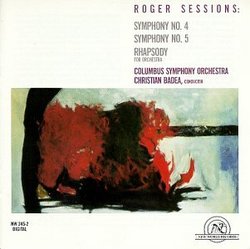| All Artists: Roger Sessions, Christian Badea, Columbus Symphony Orchestra Title: Sessions: Symphony No. 4; Symphony No. 5; Rhapsody Members Wishing: 0 Total Copies: 0 Label: New World Records Release Date: 12/8/1992 Genre: Classical Styles: Historical Periods, Classical (c.1770-1830), Modern, 20th, & 21st Century, Symphonies Number of Discs: 1 SwapaCD Credits: 1 UPC: 093228034520 |
Search - Roger Sessions, Christian Badea, Columbus Symphony Orchestra :: Sessions: Symphony No. 4; Symphony No. 5; Rhapsody
 | Roger Sessions, Christian Badea, Columbus Symphony Orchestra Sessions: Symphony No. 4; Symphony No. 5; Rhapsody Genre: Classical
|
Larger Image |
CD Details |
CD ReviewsMore Schoenberg Symphonies by Roger Sessions Discophage | France | 11/08/2007 (5 out of 5 stars) "In my review of Sessions' Third Symphony from 1957 (Roger Sessions: Symphonies Nos. 1, 2, 3) I commented that Sessions had composed the Symphony Schoenberg Never Wrote - and this wasn't a sneer. Sessions' embrace of Schoenberg's serialism resulted in works that sounded strikingly, all the way to the twists and turns of orchestration, like Schoenberg's orchestral music, from the Five Pieces opus 16 to the Variations Opus 31 and the orchestral part of his opera Moses and Aaron. The music of Schoenberg may not be immediately accessible and appealing on the surface, but through study and increasing familiarity I have grown a great love for it, and I can now recognize, and enjoy, the intense if atonal and stern lyricism they contain, as well as the drama, the rhythmic muscularity (verging sometimes on squareness), the marvels of orchestral color and counterpoint - and the same is true with Sessions' Symphonies. So if you don't know these works and Sessions' mature Symphonies in general, be prepared: if you find no appeal in Schoenberg, you are not likely to enjoy this - and the other way around. The Fourth from 1958 and Fifth from 1964 pursue the lines established with the Third Symphony, and so does the Rhapsody, a late work from 1970. You can feel that Sessions' compositional approach is imbued with a profound knowledge of the history of music, from Bach to Schoenberg via Beethoven and Brahms, and an admirable, even intimidating seriousness of intent. In the Fourth Symphony there are elements of playfulness (as in the 1st movement, "Burlesque", and at 5:36 in the "Pastorale") - but it is, well, the kind of playfulness you might expect of Schoenberg: very serious, like someone trying to go through the motions of cheerfulness, but you can feel that it is a posture rather than a natural thing. Otherwise all the hallmarks of Sessions' mature style are present: the busy counterpoint, the intricate and often chamber-like orchestration, the apparently free construction and wealth of musical events, the angular lines, the intense atonal lyricism, the drama. As I wrote in my review of the CRI disc, what makes Sessions Symphonies works of enduring interest is not only their wealth of ideas, but also that (unlike so many other American symphonies written in those years - and still today), they never resort to the most immediately easily graspable and immediately appealing solutions. Not easy listening, but highly rewarding. I haven't compared the readings by Christian Badea with others - as there are none, at least of the Symphonies (the Rhapsody was recorded in the LP era on Argo by Frederick Prausnitz, sadly not reissued). It is disheartening to think that such important works, by such a major American composer, had to wait twenty to thirty years for a recording. But let's be grateful to New World for providing this one. This is an indispensable acquisition for the Sessions admirer, and an entry as good as any for those wanting a first introduction to the composer. Excellent notes by Martin Brody. " Wonderful Sessions Symphonies Idiomatically Played! mahlerii@aol.com | Richfield, MN | 04/26/1999 (5 out of 5 stars) "The Columbus Symphony has not put out records of recent. Shame! For this recording is authoritative. Badea keeps these works on a tight rein and tension is always sustained. The sound quality sounds rather synthetic, however. The orchestra plays with great virtuosity and power, which is much impressive for a unknown orchestra. I have always enjoyed the 4th symphony, with its humourous Burlesque, the 2nd movement Elegy (with stormy middle section) and 3rd movement Pastorale. The 5th is a much more concentrated work, more on the angle of the Harris 3rd symphony. The rhapsody is a further pruning of his style as the composer was striving for more compactness of form (eg the Concerto for Orchestra, a late masterpiece)."
|

 Track Listings (5) - Disc #1
Track Listings (5) - Disc #1